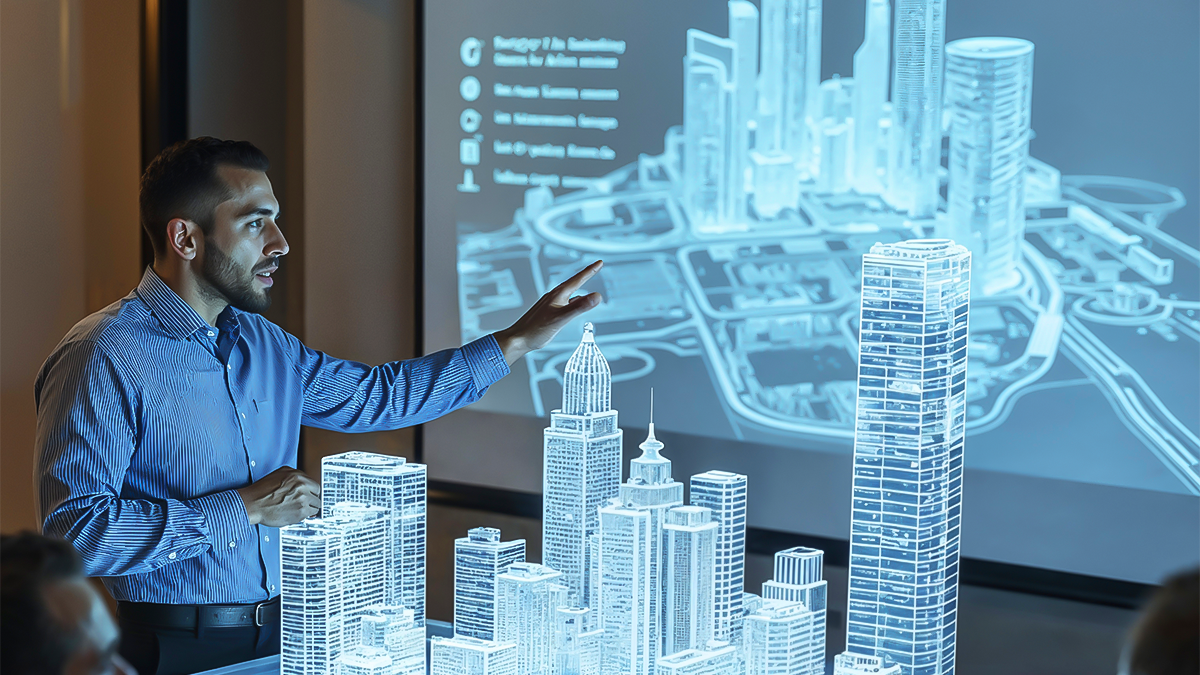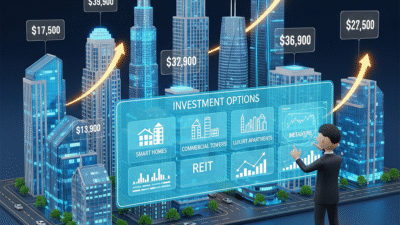In 2025, technology will revolutionize every aspect of the real estate industry from how properties are listed and toured to how deals are closed, and buildings are managed. Smart real estate leverages innovations like artificial intelligence, virtual reality, blockchain, and the Internet of Things (IoT) to enhance efficiency, transparency, and user experience. Buyers can explore homes remotely, sellers can reach global audiences instantly, and property managers can automate operations in real time.
This blog delves into the transformative power of PropTech, examining the tools reshaping the market, the benefits for investors and consumers, and what the future holds for smart real estate.
Table of Contents:
- Introduction to PropTech
- AI in property valuation and matching
- Virtual and augmented reality in property tours
- Blockchain for secure transactions and smart contracts
- IoT in smart homes and building management
- Case studies of successful tech-enabled real estate platforms
- Challenges and future trends
- Conclusion
1.Introduction to PropTech
- The real estate industry, long known for its traditional processes and slow adoption of change, is undergoing a dramatic digital transformation. At the heart of this shift is PropTech, a term that combines “property” and “technology” to describe the wave of innovation reshaping how we buy, sell, rent, manage, and invest in real estate.
- From AI-driven property search engines and virtual tours to blockchain-enabled smart contracts and automated building management systems, PropTech is redefining the industry’s landscape.
- In 2025, PropTech is no longer be optional or essential. As buyers demand more convenience, sellers seek wider reach, and investors push data-driven decisions.
- Technology is bridging the gap between old-school real estate and the fast-paced digital world. This section explores the foundations of PropTech, its evolution, and why it’s become a game-changer for the modern real estate market.
2. AI in property valuation and matching
Artificial Intelligence (AI) is transforming how properties are valued and matched with potential buyers or renters. Traditionally, property valuation depended heavily on human appraisers analyzing physical attributes, recent sales, and local market trends is a process prone to subjectivity, delays, and inconsistency. In contrast, today’s AI-driven systems offer real-time, data-rich analysis, bringing speed, precision, and transparency to the valuation process.
AI-Powered Property Valuation
AI models analyze massive datasets of historical sales, market trends, neighborhood demographics, renovation histories, nearby schools, and even crime rates to produce accurate and dynamic property valuations. Machine learning algorithms constantly refine these estimates as new data flows in, ensuring they remain up to date with changing market conditions.
For example, platforms like Zillow’s Zestimate or Redfin’s AVM (Automated Valuation Model) use AI to provide instant property value estimates. These tools help both buyers and sellers make informed decisions and negotiate more confidently.
Personalized Property Matching
AI also revolutionizes property search by matching users with homes that meet not just basic filters (like price or location) but nuanced personal preferences such as design style, proximity to lifestyle amenities, commute patterns, or even noise levels.
Recommendation engines, much like those used by Netflix or Spotify, analyze user behavior and refine suggestions over time. For instance, if a user consistently looks at modern condos near business districts, the AI will prioritize similar listings.
Benefits for Agents and Platforms
Real estate agents and platforms benefit immensely from AI-driven matching tools. These systems can:
- Automate lead scoring and customer segmentation
- Reduce time spent on unsuitable listings
- Improve conversion rates by delivering more relevant options
- Generate predictive analytics to anticipate market shifts or pricing adjustments
Enhancing User Experience
With AI, users no longer need to scroll through hundreds of listings. Instead, intelligent algorithms narrow down selections, saving time and frustration. Chatbots and virtual assistants also use natural language processing (NLP) to guide users through the search process, answer queries, and even schedule viewings.
3. Virtual and augmented reality in property tours
In today’s fast-paced, convenience-driven market, traditional property tours are evolving rapidly. Thanks to Virtual Reality (VR) and Augmented Reality (AR), prospective buyers and renters no longer need to physically visit a property to explore it. These immersive technologies are transforming real estate experiences, saving time, expanding reach, and boosting buyer confidence.
Virtual Reality (VR) Property Tours
VR enables users to take fully immersive, 3D tours of properties from anywhere in the world. Using VR headsets or even just a smartphone or desktop screen, buyers can “walk through” homes, explore floorplans, and get a feel for the layout and space.
There are two main types of VR tours:
- 360° Virtual Tours – These are panoramic images stitched together to create an interactive viewing experience. They’re cost-effective and widely used on property platforms like Zillow and Realtor.com.
- Full 3D Immersive Tours – These are more advanced and allow users to navigate a photorealistic 3D model of the property. Companies like Matterport provide this service, capturing every angle of a space and rendering it digitally.
Augmented Reality (AR) for On-Site and Remote Viewing
While VR offers fully digital experiences, AR enhances the real-world environment by overlaying digital elements through a smartphone or AR glasses. In real estate, AR can be used to:
- Stage an empty home virtually, showing potential buyers how furniture might look in the space.
- Visualize renovation ideas, like adding a wall, changing flooring, or upgrading kitchen finishes.
- Access hidden property details, such as HVAC systems, wiring paths, or appliance specifications, by pointing a device at the relevant area.
AR is especially useful for developers and off-plan property sales, allowing buyers to experience what a finished property will look like before it’s even built.
Benefits for Buyers and Sellers
- Time-saving: Buyers can tour multiple properties remotely, narrowing down choices before scheduling physical visits.
- Global reach: Investors and international buyers can explore properties in any market without traveling.
- Emotional connection: Immersive experiences allow buyers to imagine living in space, which can accelerate purchase decisions.
- Reduced need for staging: Digital staging through AR saves costs on physical furniture and decor.
Advantages for Agents and Developers
- Higher engagement: Listings with VR/AR tours get more views and longer interaction times.
- Competitive edge: Offering virtual tours sets agents and firms apart in crowded markets.
- Efficiency: Reduces no-shows and wasted time by pre-qualifying interest before physical showings.
4. Blockchain for secure transactions and smart contracts
The real estate industry has traditionally relied on lengthy paperwork, intermediaries, and complex verification steps for transactions. This process often leads to delays, high fees, and vulnerability to fraud. Enter blockchain technology, a decentralized, transparent, and tamper-proof digital ledger that revolutionizes how real estate deals are executed and recorded.
What Is Blockchain in Real Estate?
A blockchain is a distributed database where each transaction or record is securely stored in a “block” and linked chronologically to form a chain. This ledger is publicly accessible and immutable, making it nearly impossible to alter or forge records.
In real estate, blockchain is used to:
- Record ownership and property titles
- Track transaction history
- Automate contract execution
- Eliminate intermediaries such as escrow agents, title companies, and even some legal services
Smart Contracts: Automating Real Estate Agreements
Smart contracts are self-executing contracts with terms written directly into code and stored on the blockchain. Once conditions are met such as deposit payments or identity verification the contract automatically performs actions like transferring ownership or releasing funds.
Benefits of smart contracts in real estate include:
- Speed: Transactions can be completed in minutes or hours instead of weeks.
- Accuracy: Removes manual errors and ensures consistency in documentation.
- Cost-efficiency: Reduces reliance on middlemen and minimizes administrative costs.
- Trustless environment: No need to rely on a third party; the code enforces the agreement.
Secure and Transparent Transactions
Blockchain enhances trust in real estate deals by making transaction data:
- Tamper-proof: Once recorded, data cannot be changed, reducing fraud risk.
- Traceable: Full transaction histories are available for auditing.
- Accessible: Stakeholders can verify documents or ownership without relying on a central authority.
For instance, blockchain can securely store:
- Deeds and titles
- Mortgage records
- Lease agreements
- Land registries
Global Applications and Cross-Border Deals
Blockchain is especially useful for international real estate transactions, where legal complexities, currency exchange, and fraud concerns are amplified. By using blockchain:
- Payments in cryptocurrency or tokenized assets can be settled instantly.
- Ownership transfers are recorded transparently across jurisdictions.
- Investors can purchase fractional shares of properties via real estate tokens.
Challenges and Adoption Barriers
Despite its potential, blockchain in real estate faces hurdles:
- Regulatory uncertainty: Many regions lack legal frameworks for blockchain-based property transfers.
- Integration issues: Connecting blockchain systems with government land registries and traditional financial services remains complex.
- Public trust: Some buyers and sellers are still hesitant to rely on digital-only contracts.

5. IoT in smart homes and building management
The Internet of Things (IoT) is revolutionizing how properties are experienced, operated, and maintained. By embedding sensors, devices, and systems with internet connectivity, IoT enables real-time data collection, automation, and remote control making homes and buildings smarter, safer, and more energy-efficient.
What Is IoT in Real Estate?
IoT refers to a network of interconnected physical devices—such as thermostats, lighting systems, appliances, cameras, and HVAC systems—that collect and share data. In real estate, this technology is transforming both residential smart homes and commercial property management.
From door locks that recognize your smartphone to buildings that automatically adjust temperature based on occupancy, IoT creates more responsive and intelligent environments.
Smart Homes: Enhanced Comfort, Control, and Security
IoT-equipped homes offer residents unparalleled convenience and control. Common smart home features include:
- Smart Thermostats (e.g., Nest, Ecobee): Learn user behavior and optimize heating/cooling to save energy.
- Smart Lighting: Adjusts automatically based on time of day or occupancy.
- Security Systems: Include smart locks, video doorbells, motion sensors, and remote monitoring via mobile apps.
- Voice-Controlled Assistants: Like Alexa or Google Home, which manage home functions with simple voice commands.
- Appliance Automation: Fridges, ovens, washing machines, and more that can be scheduled or remotely operated.
Smart Building Management: Efficiency and Sustainability
In commercial real estate and multifamily buildings, IoT plays a critical role in automating facility management:
- Predictive Maintenance: Sensors monitor the performance of elevators, HVAC units, and other systems to detect issues before they cause failures.
- Energy Optimization: IoT tracks real-time energy use, enabling managers to reduce waste and cut costs.
- Occupancy Monitoring: Systems can adjust lighting, ventilation, and security based on room or building usage.
- Water Leak Detection: Prevents major damage and loss by identifying leaks early.
Data-Driven Decision-Making
IoT provides valuable data that property managers and owners can use to:
- Analyze usage patterns and tenant behavior
- Plan upgrades and renovations more strategically
- Monitor environmental impact
- Improve space utilization in offices or co-living spaces
Challenges and Considerations
Despite its advantages, IoT comes with some concerns:
- Cybersecurity: As more devices connect to the internet, protecting against hacking and data breaches becomes crucial.
- Integration: Combining different IoT systems into one cohesive network can be complex.
- Cost: Upfront installation and system management can be expensive, though offset by long-term savings.
6. Case studies of successful tech-enabled real estate platforms
The rise of PropTech has led to a new generation of real estate platforms that blend digital innovation with market expertise. These companies are not just improving how people buy, sell, or manage properties, but also reshaping the expectations of the entire industry. Below are real-world examples of successful, tech-driven real estate platforms that showcase how technology is delivering smarter, faster, and more efficient solutions.
1) Zillow (United States) – AI-Powered Valuation & Virtual Tours
Overview:
Zillow has become a household name in U.S. real estate by offering powerful search tools, virtual home tours, and its widely used Zestimate®an AI-powered home valuation tool.
Tech Innovations:
- Machine learning algorithms that calculate home value based on location, comparables, market trends, and user behavior
- 3D virtual home tours and interactive floorplans
- AI-driven personalization for property recommendations
Impact:
Zillow redefined the home search experience, giving users more transparency, self-service tools, and data-driven decision-making capabilities.
2) Propy (Global) – Blockchain-Powered Transactions
Overview:
Propy enables real estate transactions to occur entirely online using blockchain technology and smart contracts, making cross-border property deals fast, transparent, and secure.
Tech Innovations:
- Smart contracts that automate agreements and escrow processes
- Blockchain record-keeping for secure title transfers
- Crypto payment support for international transactions
Impact:
Propy completed the world’s first blockchain-based real estate deal and continues to streamline complex, high-risk property sales, especially across jurisdictions.
3) Matterport (Global) – Virtual Reality for Real Estate Marketing
Overview:
Matterport specializes in 3D spatial data and digital twin technology that powers immersive virtual tours for real estate listings.
Tech Innovations:
- 3D scanning hardware and software to create digital twins
- Integration with VR platforms and online property portals
- AI-based enhancements that auto-label rooms and generate measurements
Impact:
Matterport revolutionized property marketing, enabling remote tours that boost engagement and reduce the need for physical showings, especially during the COVID-19 era and beyond.
4) NoBroker (India) – Real Estate Without Middlemen
Overview:
NoBroker eliminates traditional real estate agents by directly connecting property owners and seekers through a tech-enabled platform.
Tech Innovations:
- AI-driven property recommendations and match scoring
- Integrated payment, lease generation, and document verification
- Chatbot support and virtual assistance
Impact:
With over 100 million users, NoBroker has disrupted the rental and buying market in India by drastically reducing costs and creating a more transparent ecosystem.
5) Compass (United States) – Data-Driven Brokerage for Agents
Overview:
Compass merges traditional brokerage services with powerful digital tools designed to help real estate agents market, manage, and sell properties more efficiently.
Tech Innovations:
- AI-based pricing and marketing tools
- Proprietary CRM, listing management, and client engagement platforms
- Predictive analytics for lead scoring and customer targeting
Impact:
Compass has empowered agents with tools typically unavailable in conventional brokerages, positioning itself as a tech-first real estate company with strong human support.
7. Challenges and future trends
As technology reshapes the real estate landscape, the benefits are clear—faster transactions, improved transparency, smarter management, and better user experiences. However, the road to a fully tech-integrated real estate ecosystem isn’t without challenges. Simultaneously, exciting trends continue to emerge, signaling where the industry is headed next.
Challenges in Tech-Enabled Real Estate
- Data Privacy and Security Risks: With vast amounts of sensitive data being collected, including personal information, financial details, and property histories, cybersecurity has become critical. Smart devices and cloud platforms must be secured to prevent data breaches and protect user privacy.
- Regulatory Uncertainty: Many jurisdictions lack clear legal frameworks around digital property transactions, blockchain title records, or the use of AI in valuations. This regulatory lag can create friction in adopting new technologies.
- High Implementation Costs: Smart systems, IoT infrastructure, VR/AR technology, and blockchain integrations can be expensive, particularly for small property firms or developing markets.
- Digital Literacy and Adoption: Not all users, especially older generations or those in emerging markets, are comfortable with tech-driven solutions. Real estate professionals must invest in education and support.
- Integration Complexity: Bringing together multiple technologies, like CRMs, smart building systems, and blockchain registries, into a seamless platform is challenging and can lead to inefficiencies if not managed well.
Future Trends in Real Estate Technology
- Hyperpersonalization with AI: AI will go beyond basic recommendations to offer deeply personalized real estate experiences anticipating user needs based on lifestyle, habits, and predictive analytics.
- Tokenization and Fractional Ownership: Blockchain will enable real estate assets to be split into digital tokens, allowing people to buy fractions of a property, opening access to global real estate investment.
- GreenTech and Sustainable Smart Buildings: Eco-friendly tech (like energy-monitoring IoT, green construction materials, and carbon tracking) will drive the growth of sustainable buildings as ESG (Environmental, Social, and Governance) standards rise.
- Mixed Reality for Remote Development Sales: Developers will use a blend of AR and VR to sell properties that are still under construction, allowing investors to experience entire neighborhoods virtually before they exist.
- Autonomous Property Management: With advancements in robotics and AI, tasks like cleaning, maintenance scheduling, and energy optimization could be fully automated in large buildings and smart homes.
- Decentralized Real Estate Platforms: Web3 concepts will give rise to peer-to-peer platforms without central intermediaries, enabling direct deals, decentralized governance, and user-owned ecosystems.
8. Conclusion
- As we move deeper into 2025, smart real estate is no longer just a buzzword is a transformative force reshaping how properties are bought, sold, managed, and experienced. From AI-powered valuations and immersive virtual tours to blockchain-secured transactions and IoT-enabled property management, technology is streamlining operations, enhancing transparency, and putting greater control in the hands of buyers, sellers, and investors.
- Despite ongoing challenges like cybersecurity risks, regulatory gaps, and adoption hurdles, the momentum behind PropTech is strong and growing. The real estate leaders of tomorrow will embrace innovation today, leveraging smart tools to create more efficient, sustainable, and personalized experiences.
- In a world increasingly driven by digital intelligence and automation, the question isn’t whether the real estate industry will change but how fast and how far we’re willing to go.




